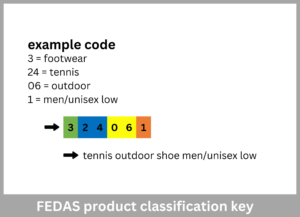SPORT 2000 International collects, adjusts and analyses data from its member countries and partners to make sound corporate decisions. The FEDAS product classification key delivers essential indicators in the form of product classification keys. In the blog post, Erika Schuh, business analyst at SPORT 2000 International, discusses why a sports item without digital data – that is, without a product classification key – is a defective good, and which panel the sports retail group is currently working on.
In today’s dynamic market environment, data is of crucial importance for companies. As an internationally operating organisation in the sports retail industry, SPORT 2000 International collects data from its member countries and analyses and adjusts it as needed. “Without data, we could not make sound strategic decisions. Data is our rear-view mirror, so to speak, allowing us to monitor our KPIs and plan our future business accordingly. Data is the foundation of how we monitor, plan, and steer the business,” says Erika Schuh, business analyst at SPORT 2000 International, emphasising the great importance of data. In addition to the diverse data sources of the SPORT 2000 member countries, SPORT 2000 International receives data from its market partners once per season. “In this way, we are able to compare our SPORT 2000 numbers with those of the industry to draw relevant conclusions,” says the data expert. She continues: “For example, we analyse which of a brand’s items are being sold in any SPORT 2000 country.”

FEDAS code: the foundation for data exchange in the sports retail industry
To analyse data in the sports retail industry, it is crucial that it is complete and harmonised. The FEDAS product classification key (PCK) ensures standardisation and harmonisation. The FEDAS code is a numeric, six-figure identifier which serves to classify sports items and simplify their identification. This structure allows brands, trading companies and specialist retailers to exchange information about products. “If this code, also known as a product classification key, is not attached to an item, it becomes difficult to make an analysis. Every company that processes sports data and reports on that basis is dependent on it,” says Schuh. If a brand does not provide data via FEDAS, the data for each item must be added manually. “In such a case, we decide as a trading company whether it is more of a tennis shoe or a lifestyle sneaker. However, our assessment could deviate from the assessment of the competition or the producer. And so, the reports would no longer be comparable within the entire sports retail industry,” adds the business analyst. Therefore, the enrichment of the FEDAS category is always dependent on the producers, as they develop the products and specify their use.
Efficient customer approach and product range design with the FEDAS code
In the sports retail world, the FEDAS code plays a decisive role, as it allows for precise categorisation. SPORT 2000 International considers three new categories to be a meaningful enhancement to the code: gender, colour and age. “This enhancement is especially useful in the e-commerce sector, as a more targeted approach and product placement increases customer satisfaction and loyalty,” says Schuh. The FEDAS code is fundamental not only in the B2C sector, but also in the B2B sector. “It ensures a smooth order process and allows the specialist retailers to design their sales areas as efficiently as possible,” adds the business analyst. Additionally, the FEDAS code also influences the budget distribution of individual retailers. “The large categories are divided among the large brands. So, a careful classification according to the FEDAS categories is even more important in the performance sector,” says Schuh.

SPORT 2000 database
SPORT 2000 International launched its own database for the collection, adjustment, and analysis of all data. “The various data sources come into our database. They are processed and prepared in the form of reports,” says Schuh, providing insight. SPORT 2000 International currently imports all the data from the dialogue groups into the system itself. But this should change: “Our SPORT 2000 countries and the brands should have their own access so they can see the reports that have been tailored to them at any time, independently.” This requires extensive provisioning and permissions to ensure data safety. During a data quality process, the program behind the database is continuously being improved and updated. “We are constantly learning more, and we know how we can continue to populate our program wisely. In principle, our database functions like an AI that we train ourselves,” says the expert.
360° market analysis through POS data panel
SPORT 2000 International is currently working on a data panel in which the POS data can be collected directly from the member countries or their specialist retailers and fed into the database automatically. Germany, Holland, Belgium and France are already part of the panel. “The panel is composed of various data sources that allow a comprehensive view of the sales process: from arrival to sell-out,” says Schuh and continues: “We see which products were sold at which prices and in which amounts, and whether the key outfits of customers as defined by the brands are actually being recognised and sold.” In this context, Schuh emphasises that the results of the sell-out reports are currently based on data from four countries, and are therefore not representative of the entire international sports retail industry.

Erika Schuh – Business Analyst at SPORT 2000 International




